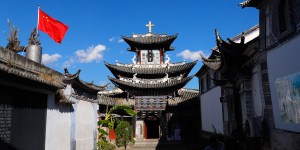Lenten Campaign 2025
This content is free of charge, as are all our articles.
Support us with a donation that is tax-deductible and enable us to continue to reach millions of readers.
To Western ears, the Chinese city of Xinxiang might well be mistaken for the province of Xinjiang. But in spite of the similarity in spelling, differentiated only by one letter in Western transliteration, Xinxiang is some 3,000 miles to the east of Xinjiang and, culturally, vastly different.
But this past week, action taken by Chinese authorities gave Xinxiang, a city of some 5 million inhabitants in Henan Province, and Xinjiang, the autonomous region in China’s northwest, inhabited by Muslim Uighurs, something in common.
For while the People’s Republic of China has been undertaking a campaign of Sinicization of the Uighurs in Xinjiang Province, amounting to a reeducation crusade that has been marked by violations of religious liberty, authorities are also imposing that Sinicization on the local Catholic Church in Xinxiang.
“Authorities in northern China have arrested a Vatican-appointed Catholic bishop, his seven priests, and an unspecified number of seminarians in what is seen as part of a renewed crackdown on the underground Catholic Church in the communist country,” reported the Union of Catholic Asian News (UCANews) on Monday. “Police arrested 63-year-old Bishop Joseph Zhang Weizhu of Xinxiang Diocese in Henan Province on May 21, a day after they detained the priests and seminarians for allegedly violating the country’s repressive new regulations on religious affairs.”
Asia News, also on Monday, reported that Bishop Zhang and 10 priests were taken to a hotel where they are being held in solitary confinement and subjected to "political sessions."
UCANews pointed out that Zhang was secretly made a bishop in 1991, because his appointment by the Vatican was not approved by the state-aligned Bishops’ Conference of the Catholic Church in China and the Chinese Catholic Patriotic Association.
Zhang has been arrested in the past, but this time authorities had new rules with which to charge him. Those rules, issued by the Chinese Communist Party, require clergy to register with the state and direct the Catholic laity to elect their bishops democratically.
UCANews pointed out that those precepts ignore a deal the Vatican entered into with Beijing in 2018 and which was renewed last fall, which “reportedly agreed on appointing bishops by mutual agreement, ending the conflict of the state appointing Catholic bishops without the Vatican’s mandate.” The news service continued:
The underground bishop has been continuously under pressure from state authorities, UCANews said: “Local Catholics said a government-appointed administrator has run the diocese since 2010 and reports to the state directly. The bishop is not allowed to manage diocesan finances and resources.”
Last week’s arrests came after the diocese decided to use an abandoned factory building as a seminary. AsiaNews said that 13 students who were arrested “were handed over to their families and forbidden to continue studying theology.”
UCANews reported:










